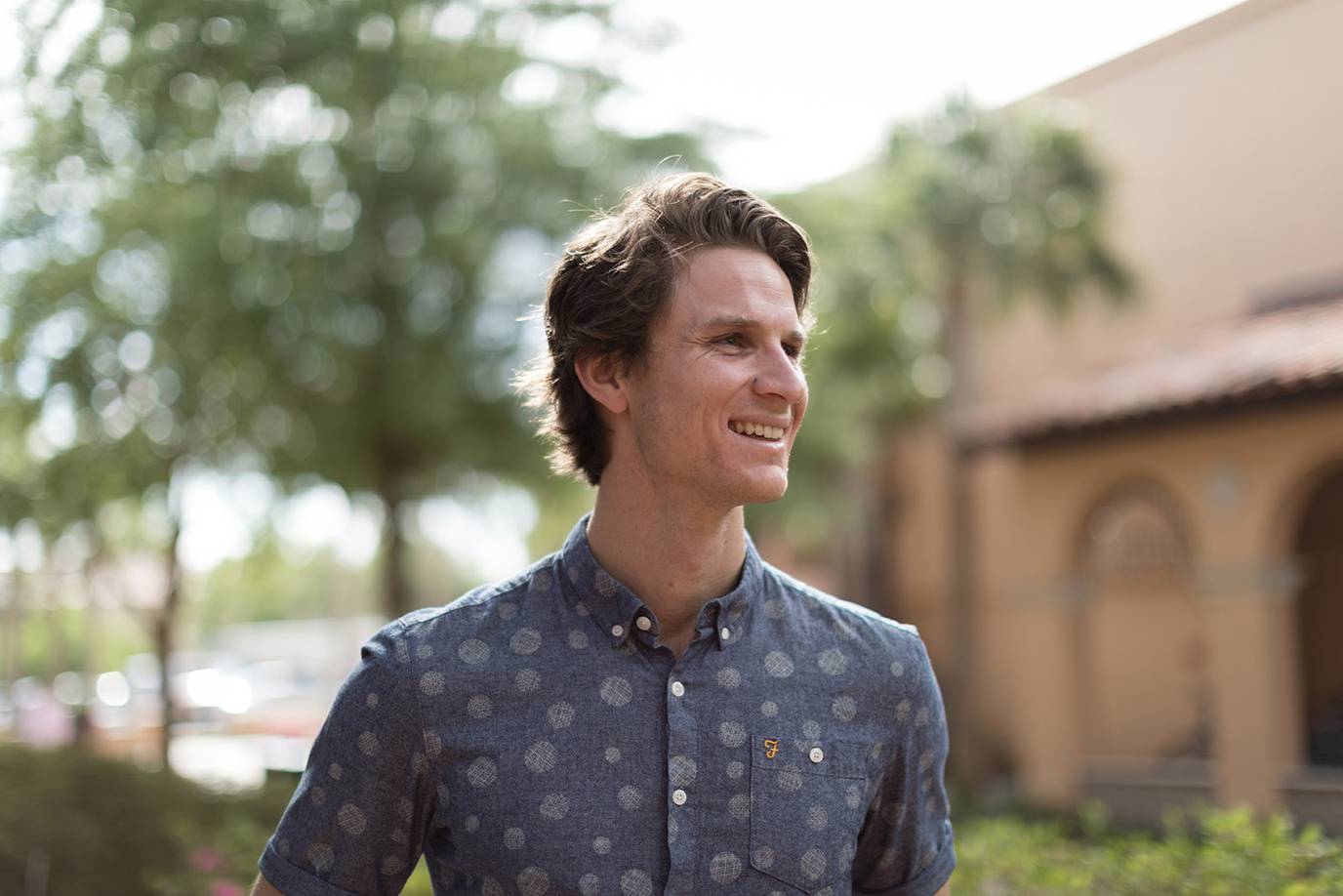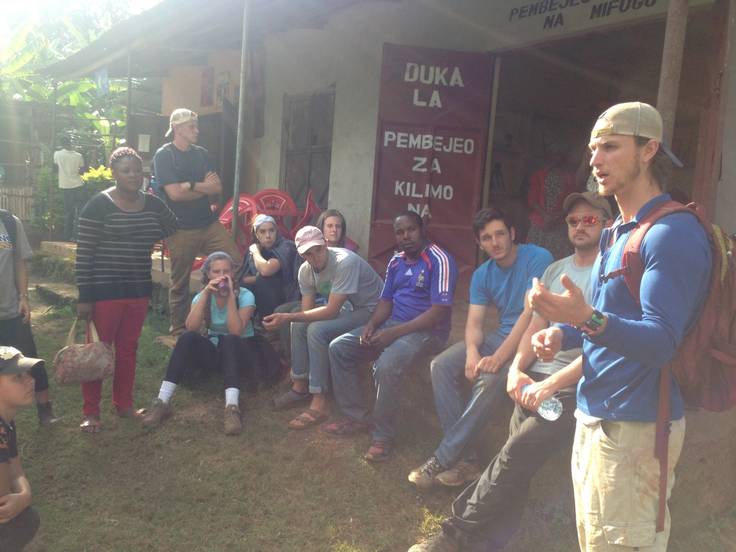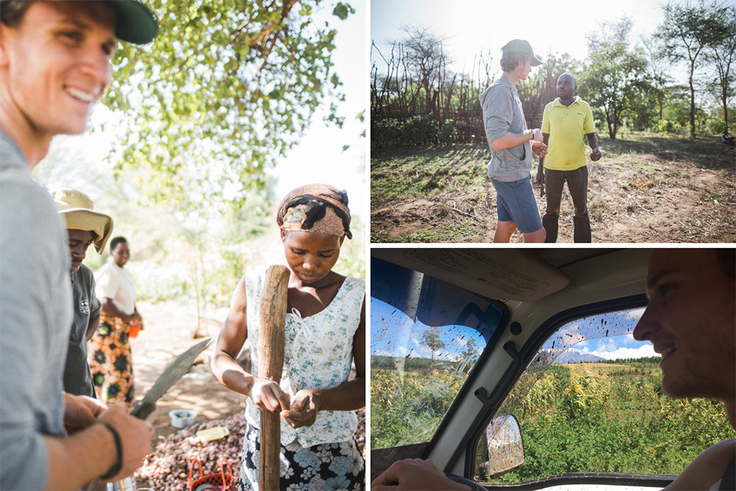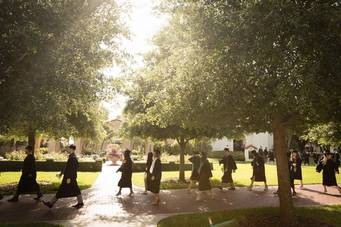Higher Calling
October 23, 2018
By Robert Stephens

Sam Barns ’11 ’12MBA has a big idea to change the world on one of the planet’s grandest mountains. He’s succeeding—in a micro-size kind of way.
The congratulatory remarks at Sam Barns ’11 ’12MBA’s graduation ceremony sounded like warning bells to him. Next up: the MBA program at Rollins’ Crummer Graduate School of Business, followed by an internship, followed by a full-time job. “This,” he thought, “might be my last chance to take a long trip.” Barns and his wife-to-be, Allison Crocker ’10 ’12MBA, researched six continents before deciding to spend 10 weeks in Tanzania. They weren’t going to change the world or even a village. But then they stepped into Mkyashi, a community tattooed to the side of Mount Kilimanjaro. From 6,000 feet up, Barns started to see his future come into focus.
Barns returned to Rollins with plans to build an ecolodge near Mkyashi that would be owned and operated by the community. He created a business plan for the lodge in a Crummer entrepreneurship class and started raising the $250,000 he figured he’d need to launch the project. When his fundraising efforts stalled well short of his target, however, Barns embarked on a decidedly DIY approach. He went back to Mkyashi for a year and worked alongside the villagers on a variety of community development projects, helping plant organic gardens and break ground on a community-operated water system.
Barns soon had dozens of Rollins reinforcements. In 2014, political science professor Dan Chong led the first of three field studies to Tanzania. The study abroad experiences are designed to teach Rollins students about community development by working alongside the Mkyashi community on Barns’ ecolodge and other infrastructure projects.
Today, Barns is executive director of Better Lives, a Nashville-based nonprofit whose work mirrors his efforts in Mkyashi. The community development organization collaborates with local partners in Cambodia, Tanzania, and Uganda who work with local communities to facilitate life-improvement initiatives like the ecolodge that is slowly taking shape in the shadow of Africa’s tallest mountain.

From improving water distribution in Uganda to working on community development projects in Tanzania, Sam Barns ’11 ’12MBA is helping people in these underserved corners of the world improve their own lives. Photos courtesy Sam Barns.
Of all the places in the world, why travel to a village in Tanzania? “Honestly, we wanted to go somewhere cheap so we could stay a while. I like mountains, so that narrowed down our options too. It started as a vacation and then turned into something much bigger.”
What exactly got your attention on the mountainside? “The place is beautiful—lush and scenic. Just incredible. But the relationships are what made it really special. We didn’t have an agenda. We hung out with the people, drank banana beer, and listened to their stories. We wanted to stay connected.”
You can come home from a trip like that with an emotional fire. What kept your fire from waning? “I saw the challenges people faced in Mkyashi, but I also saw lots of opportunities that I could contribute to. I thought about what I’d learned in [political science professor] Dan Chong’s classes: No matter what you do in community development, there will be positive and negative consequences. But you can’t just do nothing. I started thinking about building an ecolodge in Mkyashi.”
That’s a serious project. What kind of construction skills did you have? “None, but the people there have plenty of skills and smarts. What they needed from me was advocacy, a connection to people from abroad, and maybe a business plan.”
A business plan for an ecolodge in Africa—how did that take shape? “Each class I took at Crummer brought more pieces of the puzzle together. The final business plan was required in an entrepreneurship class. Putting my idea on paper made it more real. I was on an intramural basketball team with Dan, and when I showed him the plan for the ecolodge, he said, ‘If you do this, I’ll bring a group of students to help build it on a field study.’ That was really encouraging because it was a specific commitment.”
How much money did you need to raise? “The plan called for $250,000. It isn’t a huge number when you consider the value proposition over the span of many years. But a lot of the feedback was, ‘Hey, this is a great idea, but who are you to do it?’ I only raised a fraction of the original number, so after 18 months I decided to take some of what we had raised and move to Mkyashi.”
Why have you been able to do so much with so little? “Relationships. We’ve invested time to build relationships and social capital in the community. Community support amplifies the impacts of your resources. Look at the Rollins students who visited us this year. We scheduled two days for them to dig a 300-meter trench using pick axes. Dozens of community members came out to join the effort, and they finished the first day.”

You mentioned tourism. How do you embrace tourism yet protect the core values of the village? “We aren’t trying to force a Westernized idea of tourism onto the village. The ecolodge will be small, around 10 rooms. When it’s complete, the people of Mkyashi will operate it. Local ownership and operation are key parts of Better Lives’ strategy. At Rollins it’s called ‘sustainable development’ and ‘social entrepreneurship.’ It goes back to Dr. Chong’s lessons about global help: You can’t think it will all be good. There will be a little more consumption, a little more waste. The lodge is also a working farm, so we’ll neutralize the impact to the best of our ability, demonstrate new agricultural solutions, and preserve and celebrate the culture.”
Most people will go there to hike Kilimanjaro. What can you say about the hike? “Well, I’ve spent half of the past five years in Mkyashi, and as much as I love mountains and being outdoors, I’ve never hiked Kilimanjaro. The village is 6,000 feet up, so maybe that counts for something.”
Dr. Chong made good on his promise to bring students on field studies. “They’ve been to Mkyashi three times now. It’s cool to see it all come full circle with students who are a lot like I was—wanting to make the world better and wondering how to do it. They’ve helped build an outdoor kitchen, dug a trench for water, worked the garden. But Rollins students understand there’s something bigger to the picture: We’re empowering people to improve their own lives.”
Gotta ask, how would you describe Dr. Chong’s game on the basketball court? “He moves and shoots like [NBA Hall of Famer] Reggie Miller, but without the trash talk.”

Rollins Results
From our innovative curriculum to our commitment to career services, find out how Rollins prepares our graduates to lead meaningful lives and forge productive careers.
Read More
April 17, 2024
Makayle Kellison ’24 Earns Goldwater Scholarship
Makayle Kellison ’24 has earned a Goldwater Scholarship, the country’s most prestigious undergraduate scholarship for the STEM fields.
April 16, 2024
Class News: April 2024
In this monthly roundup, get the latest on what’s happening in the lives of your fellow Tars.
April 08, 2024
The Legacy of Fred Rogers '51 Lives on in Rollins' Music Department
Fred Rogers' nephew Dan Crozier, a professor of music at Rollins College, shares thoughts and memories of his uncle and previews the Mister Rogers: The Musician concert.
